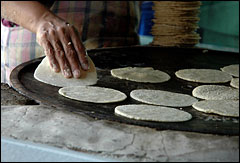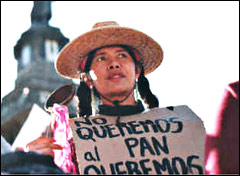Much has been made in the U.S. press about Mexico’s “tortilla crisis” — the recent spike in the price of its definitive corn-based flatbread.
Media reports tend to focus blame on U.S. ethanol production, which has surged over the past year, causing the global price of corn to double. The situation stoked the food vs. fuel debate, showing that even marginally offsetting gasoline with corn-based ethanol can have dire consequences for eaters — especially ones on a budget.

Traditionally made tortillas are a masa-have commodity in Mexico.
Photo: Dayna Bateman
But while our ravenous — and dubious — appetite for turning corn into fuel has certainly played a role in the crisis, it’s by no means our nation’s only involvement in Mexico’s tortilla nightmare.
Indeed, the same company responsible for rigging up the U.S. corn-based ethanol market is also profiting handsomely from soaring tortilla prices. Archer Daniels Midland, the leading U.S. ethanol maker and the world’s biggest grain buyer, owns a 27 percent stake in Gruma, Mexico’s dominant tortilla maker. ADM also owns a 40 percent share in a joint venture with Gruma to mill and refine wheat — meaning that when Mexican consumers are forced by high tortilla prices to switch to white bread, Gruma and ADM still win.
In Mexico, the tortilla is more than an iconic food with ancient roots. It’s a dietary staple — as important in its way as rice is to the Asian diet. According to the Mexican business daily El Financiero, Mexicans who eat a traditional diet gain 50 percent of their calories, and 70 percent of their calcium, from tortillas and other corn-based products. Another expert reckons tortillas account for 40 percent of protein in such diets. Corn cultivation originated in Mesoamerica — comprised of present-day southern Mexico and parts of Central America — and the region still maintains the crop’s most robust store of genetic diversity.
Traditional Mexican fare — tortillas and beans, supplemented by chile-pepper-based condiments and, when possible, meat — still largely sustains the nation’s vast working-poor population. The median Mexican income is $4 per day, meaning that half of the nation’s 107 million people live on that much or less. Fed by similar diets, cultures ranging from the ancient Mayans to the 16th-century Aztecs flourished.
Modern science confirms ancient ingenuity. Amanda Gálvez, a nutrition expert at the National Autonomous University of Mexico, told The Washington Post that nixtamalization — the process innovated by the Mayans to make ancient corn varieties edible — remains “absolutely wise.”
Nixtamalization involves simmering corn in a solution that includes pulverized limestone. According to Gálvez, the process frees up antioxidants, niacin, and calcium, making them available to the body. Traditional tortilla-making utilizes the whole kernel, adding critically important dietary fiber to the diet. Gálvez credits traditionally made tortillas with Mexico’s low childhood rickets rate.
“It is absolutely crucial for our population to keep eating tortillas,” she told the Post.
That became maddeningly difficult after the recent price hikes. A family of four eating a traditional diet consumes a kilogram — 2.2 pounds — of tortillas per day. A year ago, a kilo of tortillas in some areas of Mexico cost about 63 cents. By January, the prices in the same places had soared to between $1.36 to $1.81 per kilo — a big chunk of the nation’s $4.60 per day minimum wage. In short, low-income people found themselves priced out of the tortilla market, and forced into less-nutritious alternatives like white bread and ramen noodles.
Kernel Slanders
In a column last fall, I recounted the story of how corrupt 1980s-era privatization schemes dealt a serious blow to the nutritional value of tortillas. Buoyed along by his good friend the now-disgraced former president Carlos Salinas, a magnate named Roberto González Barrera used government power to rig a market for his new industrial tortilla-making process, which relies on refined corn flour rather than whole corn kernels. Its products less flavorful and nutritious than traditional tortillas, González’s method was decisively rejected by the market — and then, in the mid-1990s, it got a boost from his political cronies. Today, it accounts for about half of Mexican tortilla production — and González’s company, Gruma, controls 70 percent of the industrial tortilla market. (In the same bout of privatization that won him his tortilla powerhouse, González also pocketed a bank.)
Evidently impressed by Gruma’s ability to leverage public support for private gain, Archer Daniels Midland bought its stake in Gruma in 1996. For most of the last 10 years, Gruma used its market power with impunity. Indeed, the current crisis doesn’t mark the first time since Gruma gained market dominance that Mexican consumers have endured a jump in tortilla prices. According to Oxfam [PDF], the government watched idly while the retail price of tortillas tripled between 1994 and 1999 — even as the price of Gruma’s raw material, corn, fell steadily.
When prices soared recently, accusations swirled that Gruma was taking advantage of the global corn rally to gouge Mexican consumers on tortillas. The company claimed it was merely passing on its higher corn costs, but that claim rang hollow. U.S. ethanol makers use yellow corn, and their heightened demand for it indeed caused its global price to double. But Mexican tortilla makers use white corn, the price of which has not risen nearly as steeply.

In January, protesters marched in Mexico City with signs reading, “We don’t want bread, we want tortillas.”
Photo: Rodríguez Lucero via Flickr
This time, the government had little choice but to intervene. President Felipe Calderon gained power last fall in an election every bit as close and bitterly contested as the 2000 U.S. campaign. Widely viewed as the plutocrats’ candidate, Calderon initially waffled as public outrage over high prices mounted. In mid-January, amid rising protests, he relented, perhaps calculating that a Mexico in which the poor can’t afford tortillas would be ungovernable.
He cobbled together a “gentleman’s agreement” among tortilla makers and corn-flour processors, including Gruma/ADM and its rival, the U.S. agribusiness giant Cargill, to hold tortilla prices to about 78 cents per kilogram — well above pre-crisis levels, but below the range ($1.36 to $1.81) reported in January. Already, there are reports that tortilla vendors are violating the agreement, and protests in the Mexican capital have resumed since the agreement.
Meanwhile, the Mexican federal government is investigating charges of price-gouging among Gruma and other big players, citing “monopolistic practices in the corn-tortilla chain that are harming consumers.”
A Grande Mess
So what does this mean for Americans? It means that our largest agribusiness company, as we have shown here in Grist, has leveraged massive government support into a surging market in corn-based ethanol that serves few real environmental or social interests — and now it’s manipulating the conditions caused by the ethanol boom to squeeze profits out of Mexico.
And tortillas aren’t ADM’s only source of lucre from our neighbor to the south. After years of pressure from the U.S. Trade Representative’s Office, Mexico recently revoked its tariff against high-fructose corn syrup, setting the stage for a gusher of ADM’s vile sweetener into Mexico’s soft-drink industry.
We can’t do anything about Mexico’s political corruption, but we can demand that our own multinational corporate rogues be held to account. Yet rather than investigate ADM’s habitual use of political influence to manipulate markets, the Bush administration continues to openly act as an ally. Bush recently upped the ante on government support for ethanol. And the USDA trumpets its collaboration with ADM on making federal farm policy, recently awarding CEO Patricia Woertz a spot on its prominent annual Agricultural Outlook Forum panel where she’ll share the floor with USDA director Mike Johanns, along with Cargill’s CEO and even the president of the American Petroleum Institute.
There are at least two messages here. One is that Mexico isn’t North America’s only nation with a crony-capitalist problem. The other is this: dislodging ADM from the public trough, from which it gains the economic might that enables its exploits in places like Mexico, will require grassroots political organizing. The politicians aren’t going to do it for us.


